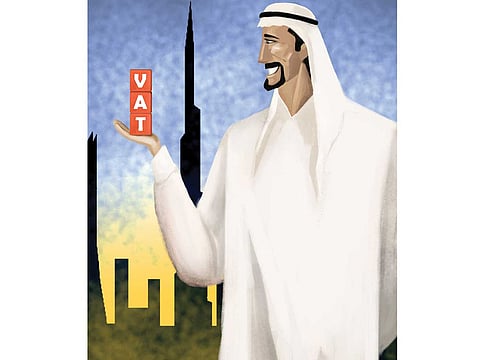Taxes will not derail the UAE dream
For its citizens, there is much more to living and working here than zero taxes

A recent article penned by the thoughtful and outspoken Emirati commentator Sultan Sooud Al Qassemi — titled “The Gulf’s New Social Contract” — is illustrative of the economic changes underway in our region. It mentions what scholars like to refer to as a century-old unwritten agreement they claim exists between Gulf governments and their people — specifically no taxation.
The story is that around 100 years ago the Arab dominated port of Lingah in southern Iran flourished under a tax-free economy, until the coastal town under Iranian control introduced taxes. Dubai cut its taxes in response and successfully lured an exodus of traders and merchants from Lingah. Al Qassemi draws a parallel between that period and today, and warns of the unforeseen consequences of introducing taxes.
The risk, he suggests, is that the people may leave. This is unlikely for several reasons.
First, a fundamental difference between circumstances in the 1890s and today is the lack of tax-free havens for GCC residents to relocate to even if they wanted. In fact, there are less than 10 countries in the world today that have neither income tax nor corporate tax and even less that don’t have Value Added Tax (VAT).
It shouldn’t be a surprise that the majority of these are in fact the GCC states.
The number of tax havens our planet hosts has been on the decline for years, accelerated by the last financial crisis when governments sought to plug holes in their public finances with the billions of unpaid tax dollars and euros. Banking disclosure rules have changed and thus reducing Swiss banking secrecy to a shadow of its former self.
America already taxes the incomes of its citizens no matter where they live, with European countries sure to follow. There’s nowhere to hide.
Second, the fundamental reason expats come to work in the GCC today is down to high economic growth (obviously driven by elevated energy prices). The fact that we have negligible corporate taxes and no income tax is merely the cherry on the cake that transforms the GCC from being a “possible” destination for expats to one that is “very desirable”.
Third, lower skilled expatriates that make up a large percentage of Gulf populations will not face much of a VAT burden as the majority of their incomes aren’t spent locally, instead these are quickly repatriated. If it’s income tax that some fear makes the GCC less attractive for our Asian neighbours, one needs to consider the purchasing power that a dirham or a dinar of income has in the GCC versus their home country.
There is a sizeable gap in purchasing power that today protects the Gulf’s competitiveness to an extent that needs to be considered. I’d argue the bigger challenge today comes from opportunities the home countries are offering their citizens. Good luck finding a cook or a driver from India today — the best candidates are getting secondary education and building their careers within a thriving hospitality industry at home.
Finally, to hazard a guess, it’s likely the GCC will adopt uniform taxes, akin to the current 5 per cent import duty that’s applied across the Gulf (and which we seem to be handling just fine). Given the region’s reliance on expatriate labour, tax rates are likely to be set at the lowest level possible as a compromise between balancing budgets and keeping the GCC competitive.
This is supported by the possibility of any single GCC state lowering their tax rate in a bid to attract trade away from other states. This should keep tax rates across the GCC from being unnecessarily high, as evidenced in Kuwait’s history during the time of Mubarak Al Kabir who ended up cutting taxes when merchant classes moved to Bahrain in protest.
The implementation of taxes will be complex and unpredictable; however we must recognise the outlying nature of our tax-free starting point relative to the rest of the world. We also shouldn’t underestimate the capacity of our populations — both local and expatriate — to adapt.
In the past century the entire world has changed, but in many ways the GCC hasn’t. Regional governments have been very generous in both protecting their private sectors and providing public services at heavily subsidised rates for far too long. At the same time, governments have used their natural resources to build a core level of infrastructure, socially and economically.
We’ve reached the time for GCC economies and its people to build on these foundations. Our challenge is to make ourselves relevant and competitive to the world for the next 100 years without the ‘easy’ advantages of natural resources. It’s said the most dangerous four words in economics are “This time it’s different”, we’re about to find out.
The writer is an asset management consultant and investor based in Dubai. You can follow him on Twitter: @alialsalim



